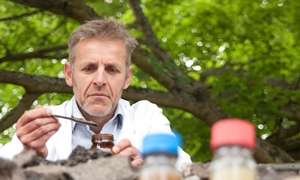Soil scientists bring UK policy down to earth
Release Date 14 December 2015

Britain will struggle to meet environmental targets around climate change, biodiversity or food production unless it improves its understanding of soil, according to scientists.
Leaders of the UK Soil Security Programme, which is led from the University of Reading, have welcomed the announcement earlier this month of a new inquiry into British soil health by the House of Commons Environmental Audit Committee.
Professor Chris Collins, University of Reading, leads the Soil Security Programme, a research consortium of 16 universities and research centres funded by UK research councils, Defra and the Scottish Government. He said a fundamental shift in attitudes towards soil is needed.
'The future of most life on Earth is dependent on a substance which totals just seven cubic km in volume' -- Prof Chris Collins
"Soil is often the forgotten link of the environment, literally trodden underfoot as attention focuses on other more obvious areas such animals, plants, air or water," Professor Collins said.
"Yet the wellbeing of our entire ecosystem is based on the health of a fragile and inches-thin layer of soil. The future of most life on Earth is dependent on a substance which totals just seven cubic km in volume. For comparison, the Earth has more than a million times more fresh water than soil."
Policy changes
The Select Committee's wide-ranging inquiry will attempt to highlight the benefits and risks of soil health on society, suggest measures to monitor soil health, and see how government policy is working or could be altered to protect soils.
Professor Collins said that a universal definition of soil health, to provide clarity across different landscapes and land uses, would help identify where most action is needed. This outcome was backed by a recent meeting of Reading's Soil Research Centre, a collection of 100-plus researchers working in areas related to soil science.
"This is a complex issue, but we cannot afford to walk away from finding meaningful measures of healthy soils," he said.
"Some policymakers have called for a blanket commitment to increase levels of carbon stored in soils, to help reduce effects of climate change, but this may not be appropriate to all soils.
"A better target would be year-on-year improvements in a number of indicators relevant to a particular land use, such as increasing stored carbon in grassland, numbers of earthworms in arable farmland, and an overall reduction in soil erosion.
"Importantly, this cannot be done in isolation. The government's 25-year plan for environment must be linked to a similar long-term plan for food and farming, to recognise the vital link that soil plays in both our natural environment and food production."
